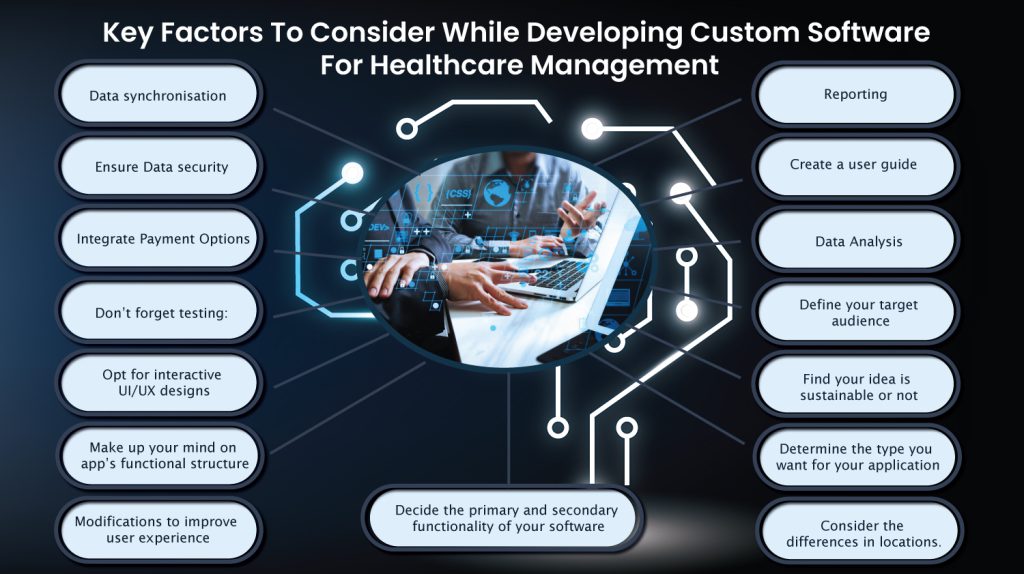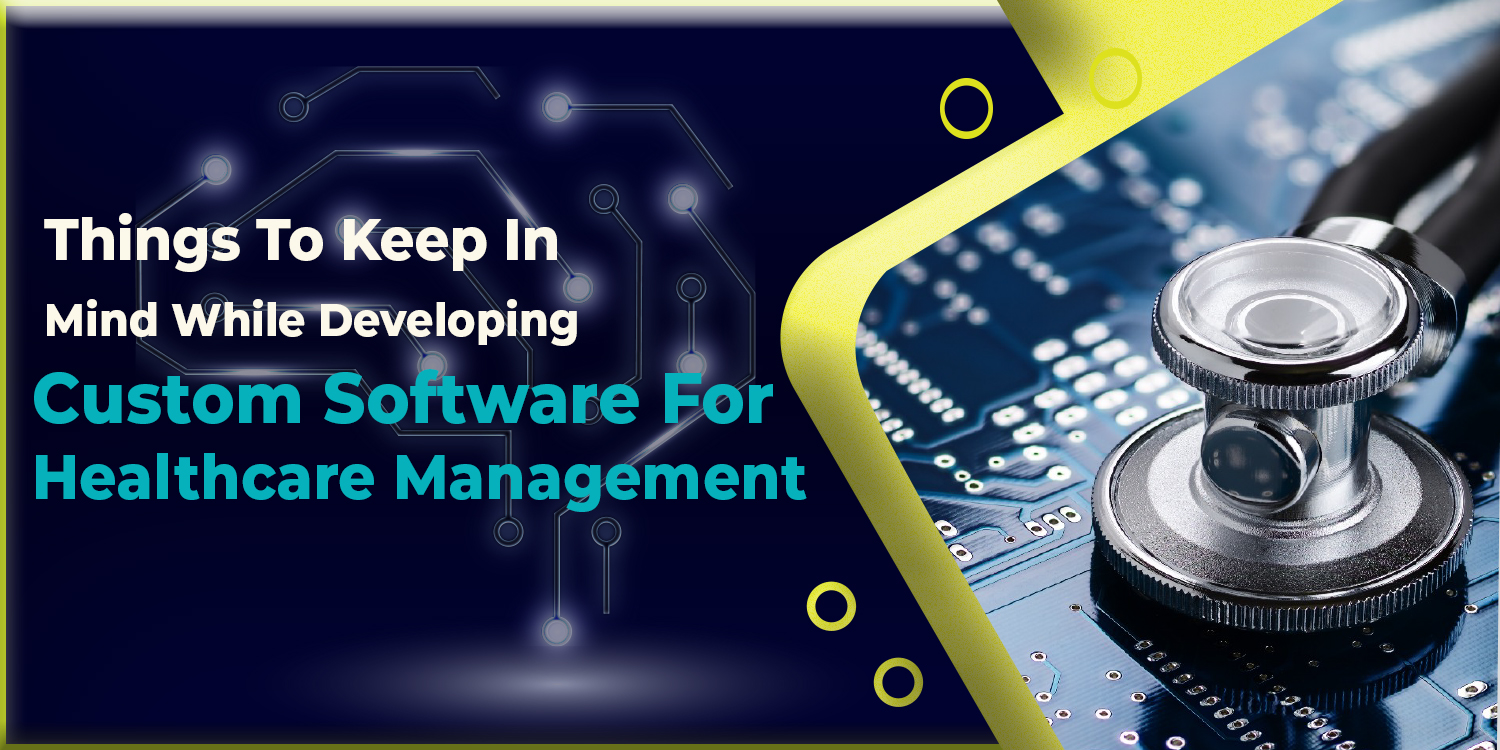With the COVID-19 pandemic, the demand for healthcare applications and software witnessed a surge in the market. Businesses associated with healthcare services are looking for software and applications that can help them out in serving their customers seamlessly in this pandemic situation where people are bound to stay at home. But sometimes, due to the hurry in shifting their healthcare business online, they miss out on several important aspects which are vital to pay attention to when developing custom software for healthcare management. Therefore, here in this blog, we will address those important aspects that play a vital role in determining whether your custom healthcare management software or system will work out in your favour or lead to failure. So let’s have a look at the factors which are a must to consider while developing custom software for healthcare management.
Table of Contents
ToggleKey Factors to Consider While Developing Custom Software for Healthcare Management
1. Define your target audience
Before jumping into the development of healthcare software, it is crucial to determine who’s gonna be your target audience because this factor will be responsible for offering wellness and safety for many patients. Therefore, first, understand your target audience in detail.
To better understand your target audience, you can consider the points mentioned below.
- Demographics: it consists of the age, gender, nationality, education, and income group of your target audience.
- Psychographic: This parameter focuses on identifying the repetitive health needs of the target audience.
- Behaviour: Keeping this aspect in mind will let you understand whether your target audience does trust software for health-related issues or not.
2. Find whether your idea is sustainable or not
The second important factor that must be considered in examining the sustainability of your healthcare software idea. If you don’t conduct proper market research on this, it’s highly plausible that your idea may fail.
Following the given checklist, you can ensure whether your idea is sustainable or not.
- Does your software solve any common issue an average person faces regarding healthcare?
- Imagine a person comes to you with the same idea, Are you willing to pay for this particular product or service? How much are you willing to pay? Answers to these questions can prove the potential of your idea to earn money.
- Is your idea scalable? Here scalability can be understood with the number of customers you can reach through the software. Would your product or service be scalable to reach more people if you want?
3. Determine the type you want for your application
For your information, healthcare software comes packed with a myriad of features that benefit from maintaining good healthcare administration to offering good care for the patients. If you want to develop healthcare software capable of performing particular activities, you need to determine the type of the application first. These are the types of applications that are high in demand and are being accepted by healthcare authorities across the globe.
- Hospital Management Softwares
- Remote Patient Monitoring
- Online Appointment Scheduling
- Electronic Health Record
- Diagnosis Software
- Medical Research System
- Medical Equipment or Medicine Marketplace

4. Decide the primary and secondary functionality of your software
When you plan to hire healthcare app developer, decide what type of healthcare software you are going to develop, it is necessary to decide the primary and secondary functionality of the software. It can be better understood via an example. If you are willing to build an online appointment scheduling software, the primary features would be User Registration, Availability of a Doctor, booking an appointment, and Payment options, while the secondary features would include a Sorting filter based on availability, booking amount, and others.
In addition to this, healthcare software or systems should get some advanced features like notifications, reminders, calendars, and activity trackers to help improve the overall user experience.
5. Create a user guide
For any software or product, a user guide is a must because it lets users understand almost every feature so easily. When it comes to healthcare software solutions, creating a user guide for your specific product would require the support of the development team or company that has worked on your project. Other than this, some important points that must be followed while creating a user guide are
- The user manual should be written in a format to understands every feature so easily.
- The language and symbols used to create user guides should be more end-user-focused.
- Make sure you specify each software function to make users’ jobs easier.
6. Consider the differences in locations.
If you are planning to launch your software globally, then you should consider the following differences based on locations like
- Time Zones
- Languages
- Unit system (currency and other measuring standards)
- Healthcare security standards
7. Make up your mind about the app’s functional structure
As you decide on the primary and secondary functions of your healthcare management system, you can also decide on the functional structure. The functional structure incorporates a hierarchy of modules, and you can decide what would be control modules, and sub-modules, and how these modules would be connected. Also, owing to these different modules, you would get a clear view of Control flow, Data flow, and operations conducted by each module in healthcare management software development.
8. Opt for interactive UI/UX designs
Interactive UI/UX designs deliver better usability of functions; therefore, a sensible selection of UI/UX designs is vital for your healthcare management software. This should also be in mind that the user going to use your software is a person with some health issue.
To make the user interface more attractive and interactive, you can use different colours, readable fonts, text alignments, and icons. Also, implementing all the visible and easy-to-use elements enhances the UX character of the software design.
9. Data synchronisation
For real-time updates of the necessary information, data synchronization is a must for the software you are willing to develop for your healthcare organization. However, it is done effectively by integrating an efficient system that performs data synchronization.
For a better understanding, if your software is a medicine marketplace, the integrated system will constantly update the information about the current medicine stock. Also, if the patient data changes like new prescription or test results data, updates should reflect in the current stock of medicine as well.
10. Ensure Data security
A patient’s personal information, medical history, test results, or prescriptions are highly confidential data in healthcare. So with a custom Healthcare software development company, you should keep data security on high priority as processing and storing such confidential information can pose a significant risk of data leak or cyber-attacks. Therefore, to ensure data security, your healthcare software solutions must comply with the regulations released by Government Medical authorities for security purposes.
Healthcare software developers working on your healthcare management system project should be proficient enough to apply different encryption methods and techniques to ensure data protection from any external malware.
11. Integrate Payment Options
If your healthcare software includes pre-payment options, marketplace, or operates on a subscription basis, your software should be incorporated with a secure payment mechanism with custom settings and features.
Thanks to healthcare software developers, you can simply integrate an automated payment system into your software, using which users can make purchases without indulging in any hectic payment procedures.
But there’s one thing that you should keep in mind is that the integrated payment method should be reliable and secure.
12. Don’t forget testing:
For any software development, testing is one of the most important phases of the development process. But with healthcare management software development, it becomes way more crucial as, in some cases, the risk is also associated with the patient’s life.
Therefore, the testers should follow the government regulations to ensure that the test strategy and execution methods are up to the mark. And with a large number of features and functionalities in a healthcare software solution, testing becomes much needed.
13. Reporting:
Reporting is a must-have feature in your healthcare management software solution because it enables the showcase of expected outcomes in a reporting format that even a layman can understand the data. Not only this, the report format or the report’s dashboard should be different for different tests conducted by the doctor. Other than this, the report features should be shared with the lab of the hospital and patient as well, but with the information, only that can be understood by him.
14. Data Analysis:
The healthcare management software you plan to launch should be packed with the data analysis feature. This feature will enable hospital authorities to prepare for the increased cases and research new diseases to handle any emergency without dismantling their workflow easily.
15. Modifications to improve user experience
Modifications or can be said updates are the best part of software development. Once your product has been built and launched in the market to use. Modifying it at the proper time interval based on customer feedback is the best way to refine your product according to users’ requirements. With modifications, you can not only user experience but also the product of your healthcare management.
Are you planning to Developing Custom Software for Healthcare Management?
Connect with our dedicated IT Professionals
Conclusion
Custom development companies are in great demand as investors want to get customized healthcare apps to fulfill the requirements of their target audience. Make sure to look for the best custom software development company that can build your project and focus on various services that you want to integrate into your app. Additionally, focus on budget planning and management while developing software for your business, as it will help you save certain investments for marketing planning. Make sure to plan your software development to create a well-optimized app to compete in the competitive landscape.
FAQs
Q1 What are the key security considerations for healthcare software?
The security of Healthcare App Development is critical. Make sure that the software you choose adheres to HIPAA requirements, has multi-factor authentication, and transmits and stores data using robust encryption. Maintaining sensitive patient data requires regular security checks and updates.
Q2 How important is user-friendly design in healthcare software?
For patients as well as healthcare practitioners, a user-friendly design is essential. To lower the learning curve and increase productivity, the interface should be simple to use and intuitive. User experience can be greatly improved with accessible support features, easy navigation, and clear instructions.
Q3 Should the software integrate with existing systems?
Yes, it is essential to integrate with current systems, such as billing, scheduling, and electronic health records (EHR). As a result, there is less effort duplication, smooth data transmission, and increased workflow efficiency. Prioritizing interoperability standards and API compatibility during development is a good idea.
Q4 How can the software support compliance with healthcare regulations?
The software’s architecture should support healthcare laws like HIPAA, GDPR, and other pertinent standards. It covers user access controls, audit trails, safe data processing, and frequent compliance checks. It’s also critical to stay informed about changes to regulations.
Q5 What features should be prioritized in healthcare management software?
Patient management, appointment scheduling, invoicing and payment processing, telemedicine capabilities, and reporting tools are among the crucial aspects. To improve functionality and satisfy a range of needs, think about incorporating capabilities for encrypted communications, prescription management, and remote patient monitoring.











